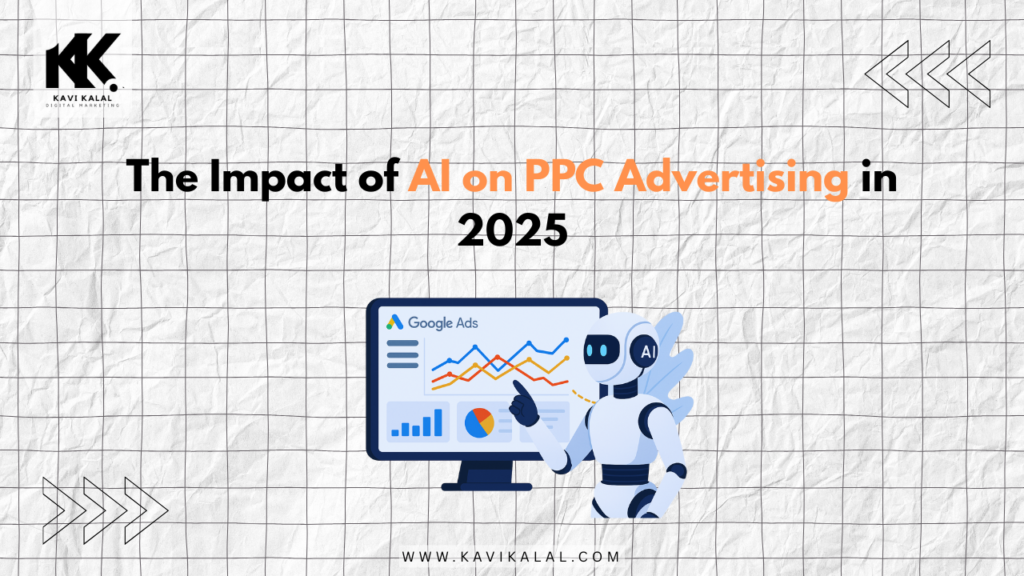Table of Contents
ToggleIntroduction
In the ever-evolving landscape of digital marketing, AI in PPC advertising has become a transformative force, reshaping how businesses approach paid campaigns. As brands strive for greater efficiency, personalization, and return on investment, the integration of artificial intelligence in digital marketing is proving indispensable. From AI-powered Google Ads to advanced machine learning in PPC, marketers now rely on intelligent tools to analyze vast data sets, optimize bids, and target audiences more precisely.
The rise of AI tools for PPC brings unmatched speed and accuracy, enabling real-time decision-making that enhances campaign performance. With PPC automation with AI, routine tasks such as keyword bidding, ad scheduling, and performance tracking are streamlined, allowing marketers to focus on strategy and creativity. This shift underscores the profound AI impact on online advertising, pushing the boundaries of what’s possible in digital outreach.
As we explore the future of PPC advertising, it’s clear that AI isn’t just a trend—it’s the new standard. This blog delves into how AI changes PPC campaigns, the practical benefits of AI in PPC marketing, and what advertisers need to know to stay competitive in this evolving space. Welcome to the AI-driven era of PPC.
1. The Impact of AI on PPC Advertising
In recent years, the digital marketing landscape has shifted dramatically, with AI in PPC advertising emerging as a game-changing force. As businesses look for smarter ways to reach their audiences, artificial intelligence has become the key to unlocking real-time insights, automation, and higher ad performance. By analyzing massive datasets and predicting user behavior, AI transforms traditional PPC models into intelligent, outcome-driven strategies.
Whether it’s PPC automation with AI, smarter bidding strategies, or precision targeting, AI is now central to online advertising success. Advertisers can personalize campaigns, allocate budgets more efficiently, and respond instantly to user engagement. This shift doesn’t just improve ROI—it completely redefines how ads are created, delivered, and optimized.
The AI impact on online advertising goes beyond simple automation. It enhances campaign performance by minimizing wasteful spend and improving ad relevance. As more companies embrace AI-driven solutions, understanding the benefits of AI in PPC marketing becomes crucial for staying competitive in a saturated marketplace.
This blog explores the complete transformation—from how AI changes PPC campaigns to the future of PPC advertising—and provides practical insights into using AI tools for PPC to gain a strategic edge in your advertising efforts.
2. Understanding the Role of AI in PPC Advertising
The role of AI in PPC advertising is evolving rapidly, shifting from a supportive tool to a central force driving campaign success. AI helps marketers automate repetitive tasks, analyze user behavior, and predict ad performance with greater accuracy. This results in better decision-making and higher ROI for advertisers.
Today, AI is deeply integrated into PPC platforms, enabling advanced features like smart bidding, audience segmentation, and real-time optimization. These capabilities allow advertisers to reach the right audience at the right time with minimal manual intervention. For instance, platforms like AI-powered Google Ads use algorithms to dynamically adjust bids and tailor ads based on user intent and behavior.
This level of automation and accuracy is not achievable through manual efforts alone. As artificial intelligence in digital marketing continues to advance, PPC campaigns are becoming more cost-effective and efficient. Businesses can now scale their efforts while maintaining performance consistency across multiple channels.
Understanding how AI functions in PPC is vital for any digital marketer. It provides a competitive edge in a fast-moving advertising ecosystem. Ultimately, AI isn’t just a tool—it’s a strategy that enhances campaign performance, ensures smarter spending, and drives better customer engagement.
3. How Artificial Intelligence in Digital Marketing is Revolutionizing PPC
Artificial intelligence in digital marketing is transforming how PPC campaigns are managed, optimized, and scaled. With AI taking the wheel, marketers are no longer dependent on guesswork or manual adjustments. Instead, data-driven decisions powered by intelligent algorithms now guide every step of the PPC journey.
AI helps advertisers identify high-converting keywords, create more personalized ads, and forecast user behavior. These insights enable campaign managers to allocate budgets efficiently and adjust bids in real time. With tools that continuously learn and adapt, AI ensures that PPC campaigns stay competitive in an ever-changing marketplace.
What makes this revolution unique is the ability of AI to deliver both speed and precision. Whether it’s A/B testing ad creatives or adjusting ad placements based on performance, AI automates critical processes that once took hours or days. As a result, marketers can focus on strategy rather than execution.
This shift also opens the door for small businesses to compete with larger brands. By using AI tools for PPC, even limited-budget campaigns can achieve impressive results. The integration of AI marks a new chapter in online advertising—one where performance is not only optimized but consistently improved through intelligent technology.
4. Top AI Tools for PPC Advertisers in 2025
As AI continues to reshape the digital marketing landscape, AI tools for PPC are providing advertisers with sophisticated solutions to optimize their campaigns and enhance efficiency. In 2025, cutting-edge tools are empowering PPC managers to streamline tasks like keyword research, bidding, and targeting, all while boosting overall campaign performance.
One of the most advanced tools in the PPC space is Google Ads Smart Bidding, which employs machine learning to adjust bids dynamically based on real-time data. This automation allows advertisers to focus more on strategy while ensuring that their budgets are spent in the most effective way possible. Other notable tools include Optmyzr and WordStream, which use AI to provide detailed performance insights, optimize keywords, and automate bid strategies. These platforms empower PPC professionals to make data-backed decisions and keep up with market trends.
The rise of AI-powered Google Ads brings added advantages, including responsive search ads that dynamically change content based on user search queries. This personalization ensures that the ads are more relevant to each user, which can significantly increase the chances of conversion. AI in PPC is making campaigns smarter, faster, and more efficient, ultimately providing higher returns on ad spend.
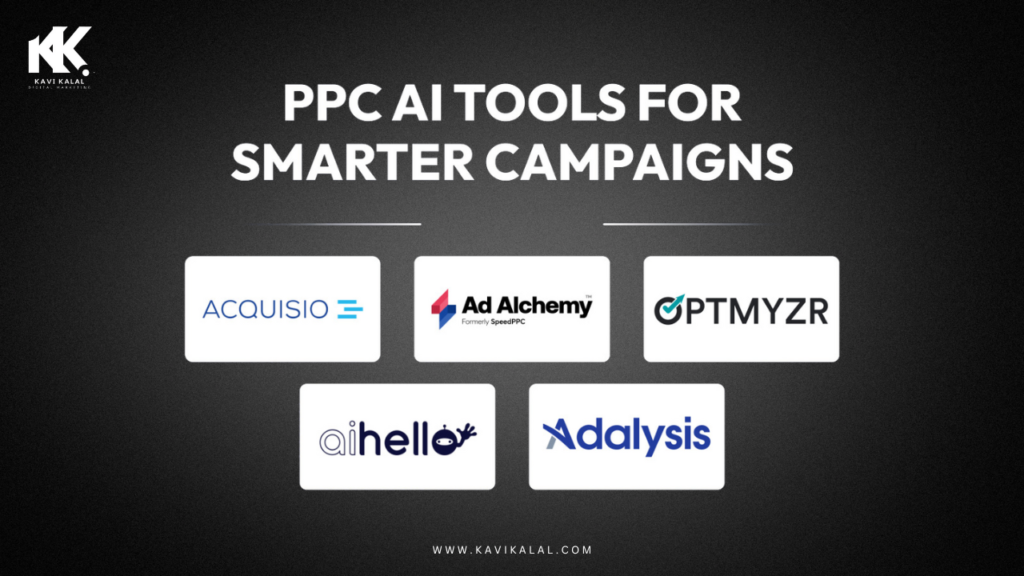
5. Maximizing Results with PPC Automation with AI
Leveraging PPC automation with AI is a game-changer for digital advertisers aiming to improve efficiency and achieve optimal results. AI is capable of handling repetitive tasks that once required manual input, such as adjusting bids, selecting keywords, and optimizing ad placements. By automating these tasks, advertisers can free up valuable time to focus on creative and strategic decisions.
One of the main advantages of PPC automation with AI is the ability to optimize campaigns in real-time. For example, AI can automatically pause underperforming ads or shift budgets to higher-performing ones, ensuring that the campaign runs at its highest potential. By continuously analyzing data from various sources, AI helps in fine-tuning campaigns, improving click-through rates, and enhancing the overall user experience.
This automated approach to PPC allows businesses to scale their campaigns without sacrificing precision. With AI’s ability to predict user behavior and adjust campaigns accordingly, advertisers can expect a much higher return on investment. AI is transforming online advertising by providing a level of automation and optimization that would be impossible to achieve manually.
6. The Real AI Impact on Online Advertising Strategies
The AI impact on online advertising is profound, particularly in the realm of PPC. AI has revolutionized how advertisers target their audiences, create ad content, and optimize their campaigns. With the ability to analyze large datasets and make predictive decisions, AI has allowed for more personalized and efficient ad delivery than ever before.
By integrating artificial intelligence in digital marketing, businesses are able to tailor their ads to specific consumer behaviors, ensuring that each ad is relevant to the viewer. Machine learning in PPC enables advertisers to adjust their strategies based on real-time data, identifying the best-performing ads and targeting the right audience segments. This continuous optimization increases the effectiveness of campaigns, ensuring a higher likelihood of conversion.
Furthermore, AI is streamlining the entire process of PPC campaign management, from keyword selection to ad placement. AI-powered tools automate many of the manual processes involved, allowing marketers to focus on high-level strategies. With AI’s ability to predict market shifts and user behavior, PPC strategies are becoming more proactive and data-driven, providing businesses with a competitive edge in the online advertising space.
7. Exploring the Future of PPC Advertising in an AI-Driven World
The future of PPC advertising is undeniably intertwined with AI. As AI technologies continue to evolve, they are expected to play an even more prominent role in shaping digital advertising strategies. In the coming years, the way we approach PPC campaigns will be drastically transformed, driven by advanced machine learning algorithms and automated tools.
AI’s role in PPC advertising will shift toward a more holistic approach. Beyond optimizing individual ads, AI will enable advertisers to manage entire campaigns more efficiently by continuously analyzing and predicting trends. With AI’s ability to process vast amounts of data in real-time, it will provide actionable insights that help businesses adjust their strategies on the fly. Whether it’s targeting new demographics or identifying emerging opportunities, AI will empower PPC marketers to stay ahead of the curve.
Moreover, as AI-powered Google Ads become more sophisticated, advertisers will gain the ability to leverage personalized ad experiences at a much larger scale. In the future, AI’s ability to adapt and predict will make it possible to hyper-target users based on more complex behavior patterns. This evolution will lead to smarter, more relevant ads that enhance user engagement and drive conversion rates to new heights. To stay ahead in this fast-evolving landscape, enrolling in a digital marketing course can equip you with the skills needed to thrive.
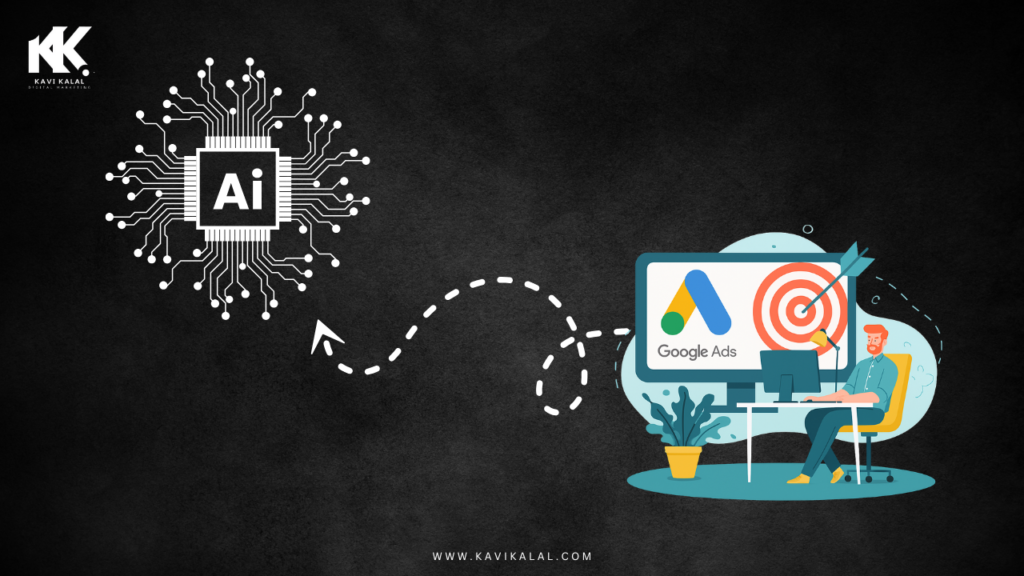
8. How AI-Powered Google Ads are Transforming Paid Search
One of the most notable advancements in AI in PPC advertising is the rise of AI-powered Google Ads. Google’s AI algorithms are now deeply integrated into its advertising platform, giving advertisers access to more intelligent bidding strategies, personalized ads, and automated insights that optimize campaign performance.
With AI-powered Google Ads, marketers can now implement responsive search ads that adjust headlines and descriptions to fit the search query and user intent. These dynamic ads are designed to appear more relevant to users, increasing the chances of clicks and conversions. Additionally, Google’s Smart Bidding feature uses AI to optimize bids based on a range of factors, including device type, time of day, location, and user behavior, allowing advertisers to reach their audience with greater precision.
The power of machine learning in PPC is evident as it continuously refines ad targeting and bidding strategies, ensuring that every dollar spent on ads is used efficiently. As more businesses embrace these AI-driven solutions, paid search is becoming increasingly competitive, and the ability to leverage Google’s advanced features will be a critical factor in driving success.
9. The Role of Machine Learning in PPC Campaign Optimization
Machine learning in PPC plays a critical role in optimizing campaigns by enabling automated adjustments based on continuous data analysis. Unlike traditional methods, where marketers manually tweak campaigns, machine learning allows for real-time optimization, improving ad performance with minimal human intervention.
By incorporating machine learning into PPC campaigns, advertisers can take advantage of predictive analytics, which helps forecast user behavior and conversion probabilities. For example, machine learning algorithms analyze historical data to identify patterns in user clicks and interactions. This allows the system to make real-time adjustments to bids, ad copy, and targeting strategies.
Furthermore, machine learning in PPC aids in identifying underperforming elements of a campaign and optimizing them. Whether it’s refining keyword lists, adjusting ad placements, or modifying bidding strategies, machine learning ensures that campaigns run at maximum efficiency. Over time, as the algorithms gather more data, the system becomes smarter and more effective, leading to increasingly optimized campaigns with higher conversion rates.
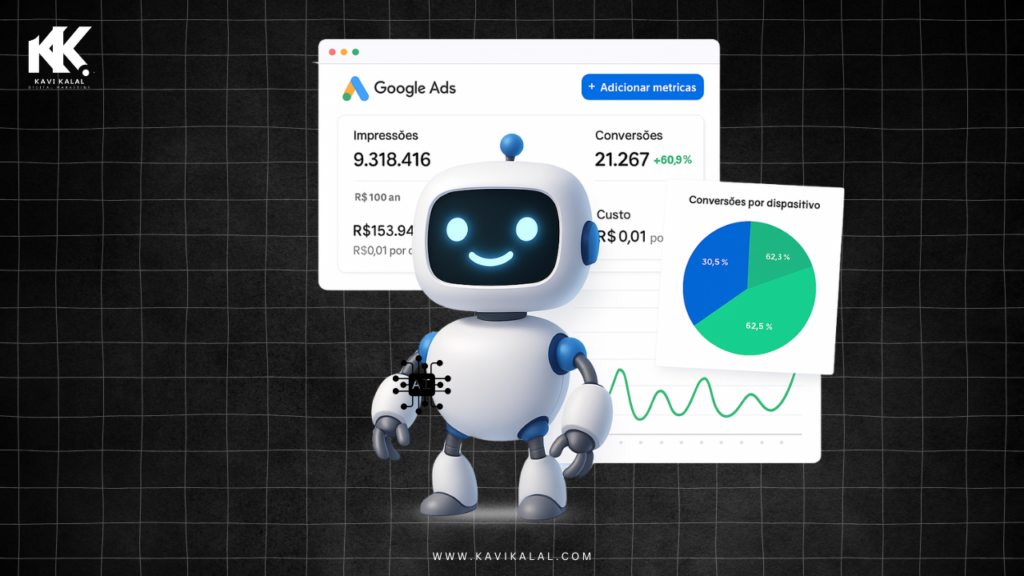
10. How AI Changes PPC Campaigns from Strategy to Execution
AI in PPC advertising is reshaping the way campaigns are conceptualized, executed, and refined. Traditionally, PPC campaigns required manual planning and execution, relying heavily on human oversight and adjustments. However, AI has streamlined this process by automating various aspects of campaign management, from strategy development to execution.
One of the biggest ways AI changes PPC campaigns is through advanced automation. Marketers no longer need to spend hours manually adjusting bids or researching keywords. Instead, AI tools automatically analyze data, adjust bids, and even recommend the best-performing ads. This allows for faster, more efficient campaign execution, reducing the need for constant monitoring and adjustments.
Moreover, AI helps optimize the strategy behind a PPC campaign. Through predictive analytics and real-time insights, AI can recommend changes to the strategy, such as shifting budgets to higher-performing keywords or targeting new audiences based on user behavior. As AI continues to advance, it will further refine the execution of PPC campaigns, providing deeper insights and maximizing the overall performance of paid ads.
11. Benefits of AI in PPC Marketing
The integration of AI in PPC marketing has brought about numerous benefits that have significantly improved the effectiveness of online advertising. From automation to optimization, AI has transformed the way PPC campaigns are run, providing marketers with smarter, more data-driven solutions.
One of the key benefits of AI in PPC is enhanced targeting. AI algorithms analyze large volumes of data to identify patterns in user behavior, helping marketers pinpoint the most relevant audience segments. This leads to more accurate targeting, reducing wasted ad spend and improving conversion rates.
Another advantage is the automation of repetitive tasks. With AI tools, tasks like bid adjustments, keyword research, and ad placement optimization are automated, freeing up valuable time for marketers to focus on high-level strategy. This leads to greater efficiency and allows businesses to scale their PPC campaigns more effectively.
Furthermore, machine learning in PPC enables real-time optimization, ensuring that ads are continuously refined for maximum performance. As AI tools learn from each interaction, they become better at predicting the best times to serve ads, the optimal bid amounts, and the most relevant ad content. This leads to higher engagement, better ROI, and an overall more successful PPC campaign.
FAQS
What is AI in PPC advertising?
AI in PPC advertising refers to the use of artificial intelligence technologies to automate, optimize, and enhance various aspects of Pay-Per-Click (PPC) campaigns. AI tools analyze large datasets to make real-time adjustments to bidding strategies, ad targeting, and keyword selection. With AI, advertisers can improve ad performance, reduce manual effort, and achieve better results by automating repetitive tasks. Over time, AI-powered systems learn from user behavior and optimize campaigns for increased conversion rates and better ROI, making AI in PPC advertising essential for staying competitive in the digital marketing space.
How does AI impact online advertising?
AI impacts online advertising by automating processes such as bidding, targeting, and ad optimization, leading to more effective campaigns. AI analyzes user data, learns from interactions, and makes real-time adjustments to improve targeting and ad relevance. This results in better ROI as ads are shown to the right audience at the right time. AI can also predict user behavior, allowing advertisers to fine-tune their strategies for higher conversion rates. In short, AI helps advertisers enhance campaign efficiency, reduce waste, and maximize returns in online advertising.
What are the benefits of AI in PPC marketing?
The benefits of AI in PPC marketing include enhanced targeting, automation, and optimization. AI tools allow advertisers to identify the most relevant audience segments based on data-driven insights, improving conversion rates. Automation eliminates repetitive tasks, freeing up time for strategic planning. AI also provides real-time optimizations by analyzing performance data, ensuring that campaigns are continuously improved. Over time, as the AI system learns from data, it fine-tunes bidding strategies, ad placements, and keyword choices, leading to better performance and higher ROI in PPC campaigns
How does machine learning enhance PPC campaigns?
Machine learning enhances PPC campaigns by analyzing large volumes of data to predict user behavior and optimize campaign performance. Machine learning algorithms continuously improve ad targeting, bid adjustments, and keyword selection by recognizing patterns in user interactions. This allows advertisers to make data-driven decisions and achieve higher conversion rates. As machine learning models gather more data, they get smarter and more accurate in predicting outcomes, which leads to better ad performance, reduced ad spend waste, and more efficient use of resources in PPC campaigns.
What is PPC automation with AI?
PPC automation with AI involves using AI-powered tools to automate the management and optimization of PPC campaigns. AI handles tasks such as adjusting bids, selecting keywords, and targeting the right audience. By automating these processes, advertisers save time and reduce human error. AI continuously analyzes data from ads, learning from interactions and making adjustments in real-time. As a result, PPC automation with AI helps advertisers run more efficient campaigns, improve performance, and achieve better results without the need for constant manual input.
How does AI-powered Google Ads work?
AI-powered Google Ads uses machine learning to automate bidding, improve targeting, and optimize ad performance. By analyzing vast amounts of data, AI helps advertisers create more relevant ads for their target audience. Google’s Smart Bidding feature adjusts bids in real-time, based on factors like location, device, and time of day, to maximize conversions. Additionally, AI-powered Google Ads can generate responsive search ads that change their headlines and descriptions to match the user’s search intent, increasing the likelihood of clicks and conversions, leading to better campaign outcomes.
What is the future of PPC advertising with AI?
The future of PPC advertising is closely tied to the growth of AI technologies. In the coming years, AI will become even more integrated into PPC platforms, providing enhanced targeting, smarter bidding, and real-time optimization. AI will enable hyper-targeted ad campaigns that deliver personalized experiences at scale. Machine learning will continuously refine PPC strategies, leading to more efficient use of budgets and higher conversion rates. As AI evolves, it will automate even more aspects of PPC management, making campaigns more streamlined, effective, and cost-efficient, changing the way digital advertising is done.
